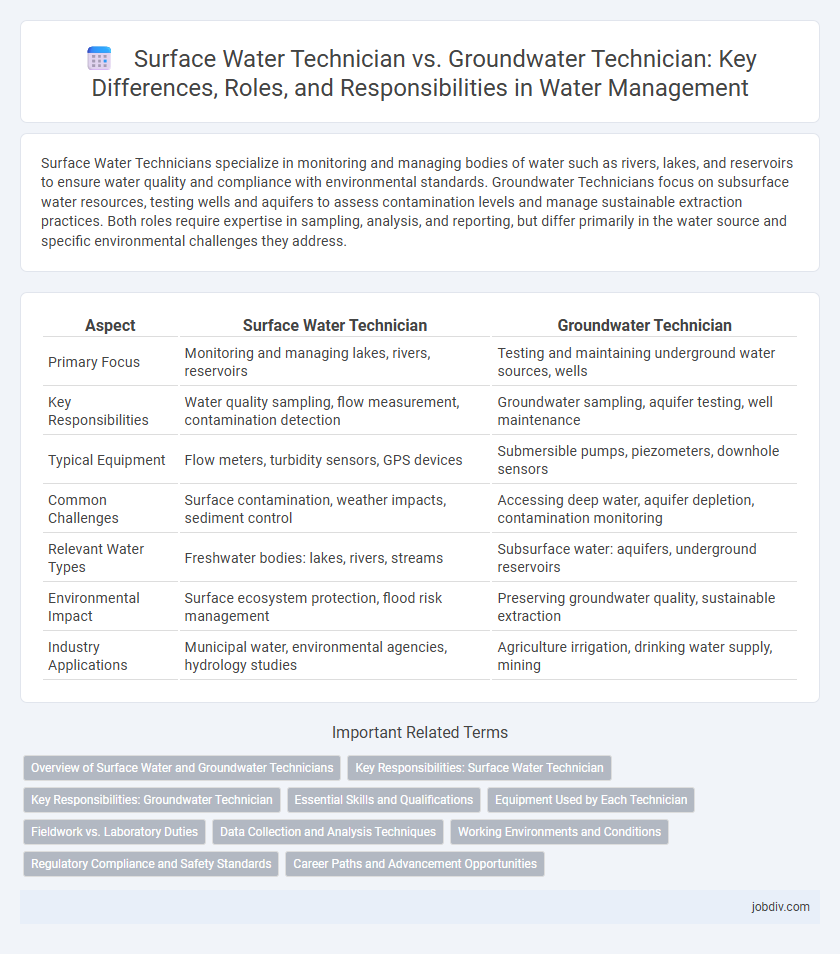Surface Water Technicians specialize in monitoring and managing bodies of water such as rivers, lakes, and reservoirs to ensure water quality and compliance with environmental standards. Groundwater Technicians focus on subsurface water resources, testing wells and aquifers to assess contamination levels and manage sustainable extraction practices. Both roles require expertise in sampling, analysis, and reporting, but differ primarily in the water source and specific environmental challenges they address.
Table of Comparison
| Aspect | Surface Water Technician | Groundwater Technician |
|---|---|---|
| Primary Focus | Monitoring and managing lakes, rivers, reservoirs | Testing and maintaining underground water sources, wells |
| Key Responsibilities | Water quality sampling, flow measurement, contamination detection | Groundwater sampling, aquifer testing, well maintenance |
| Typical Equipment | Flow meters, turbidity sensors, GPS devices | Submersible pumps, piezometers, downhole sensors |
| Common Challenges | Surface contamination, weather impacts, sediment control | Accessing deep water, aquifer depletion, contamination monitoring |
| Relevant Water Types | Freshwater bodies: lakes, rivers, streams | Subsurface water: aquifers, underground reservoirs |
| Environmental Impact | Surface ecosystem protection, flood risk management | Preserving groundwater quality, sustainable extraction |
| Industry Applications | Municipal water, environmental agencies, hydrology studies | Agriculture irrigation, drinking water supply, mining |
Overview of Surface Water and Groundwater Technicians
Surface Water Technicians specialize in collecting and analyzing water samples from rivers, lakes, and reservoirs to monitor quality and detect pollutants. Groundwater Technicians focus on sampling and testing water from wells and aquifers, assessing underground water resources and contamination levels. Both roles require expertise in water chemistry, environmental regulations, and data reporting but differ primarily in the water source and monitoring techniques used.
Key Responsibilities: Surface Water Technician
Surface Water Technicians specialize in monitoring and managing lakes, rivers, and reservoirs to ensure water quality and ecosystem health. Their key responsibilities include collecting and analyzing water samples, measuring flow rates, and assessing pollutant levels to support environmental compliance. They also maintain monitoring equipment and generate detailed reports to aid in surface water resource management and protection.
Key Responsibilities: Groundwater Technician
Groundwater Technicians specialize in monitoring and sampling aquifers, conducting well installations, and analyzing groundwater quality to ensure safe water supply. Their key responsibilities include maintaining monitoring equipment, collecting and interpreting hydrogeological data, and addressing contamination issues. They collaborate with environmental engineers to design remediation strategies and comply with water resource regulations.
Essential Skills and Qualifications
Surface Water Technicians require expertise in hydrology, water sampling, and field data collection, often working with rivers, lakes, and reservoirs to monitor water quality and flow rates. Groundwater Technicians specialize in subsurface water analysis, necessitating skills in well drilling, aquifer testing, and groundwater modeling to assess contamination and water availability. Both roles demand proficiency in environmental regulations, data analysis software, and safety protocols to ensure accurate monitoring and protection of water resources.
Equipment Used by Each Technician
Surface Water Technicians commonly utilize portable water quality meters, flow meters, and sediment samplers to monitor rivers, lakes, and reservoirs. Groundwater Technicians rely on specialized equipment such as submersible pumps, bailers, and automatic water level loggers to extract and analyze aquifer samples. Both technicians employ GPS devices and data loggers, but their tools are tailored to surface or subsurface water environments for accurate assessment.
Fieldwork vs. Laboratory Duties
Surface Water Technicians primarily conduct fieldwork, collecting samples from rivers, lakes, and reservoirs to monitor water quality and assess environmental conditions. Groundwater Technicians balance field duties with laboratory analysis, extracting samples from wells and aquifers before testing for contaminants and water characteristics. Laboratory responsibilities are more intensive for Groundwater Technicians due to the complexity of subsurface water chemistry and contamination assessment.
Data Collection and Analysis Techniques
Surface Water Technicians utilize flow meters, water quality sensors, and remote sensing technologies to collect real-time data from rivers, lakes, and reservoirs, focusing on parameters like turbidity, temperature, and dissolved oxygen. Groundwater Technicians employ well logging, groundwater sampling, and aquifer testing methods to analyze subsurface water quality, hydraulic conductivity, and contaminant levels through soil and rock formations. Both roles require expertise in Geographic Information Systems (GIS) and data modeling software to interpret hydrological patterns and support water resource management.
Working Environments and Conditions
Surface water technicians primarily operate in rivers, lakes, and reservoirs, often working outdoors in variable weather conditions, including exposure to sun, rain, and fluctuating temperatures. Groundwater technicians typically work in more controlled environments such as wells, boreholes, and aquifers, requiring frequent underground or confined space operations with potential exposure to low light and moisture. Both roles demand adherence to safety protocols, but surface water technicians face more dynamic environmental challenges, whereas groundwater technicians navigate restricted access and equipment handling in subsurface settings.
Regulatory Compliance and Safety Standards
Surface water technicians specialize in monitoring lakes, rivers, and reservoirs to ensure compliance with EPA and state water quality standards, focusing on contamination assessment and treatment efficacy. Groundwater technicians manage aquifer sampling and well maintenance, adhering to strict regulations under the Safe Drinking Water Act and state-specific groundwater protection guidelines. Both roles implement rigorous safety protocols, including confined space entry training and hazardous material handling, to mitigate risks in their respective environments.
Career Paths and Advancement Opportunities
Surface Water Technicians specialize in monitoring and managing rivers, lakes, and reservoirs, offering career advancement into environmental consulting, hydrology, or water resource management. Groundwater Technicians focus on subsurface water analysis, providing pathways toward roles in hydrogeology, environmental remediation, and regulatory compliance. Both career paths demand technical expertise and offer growth opportunities in water quality assessment, data analysis, and sustainable water resource development.
Surface Water Technician vs Groundwater Technician Infographic

 jobdiv.com
jobdiv.com